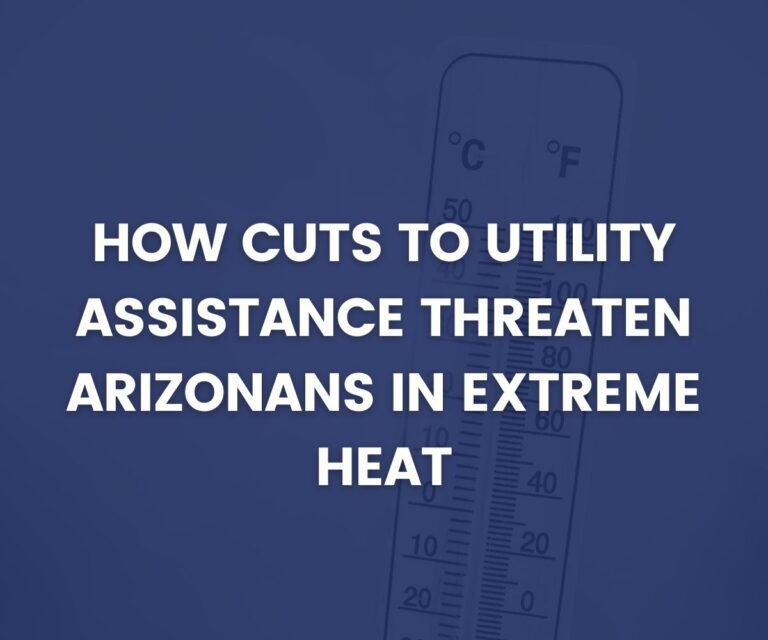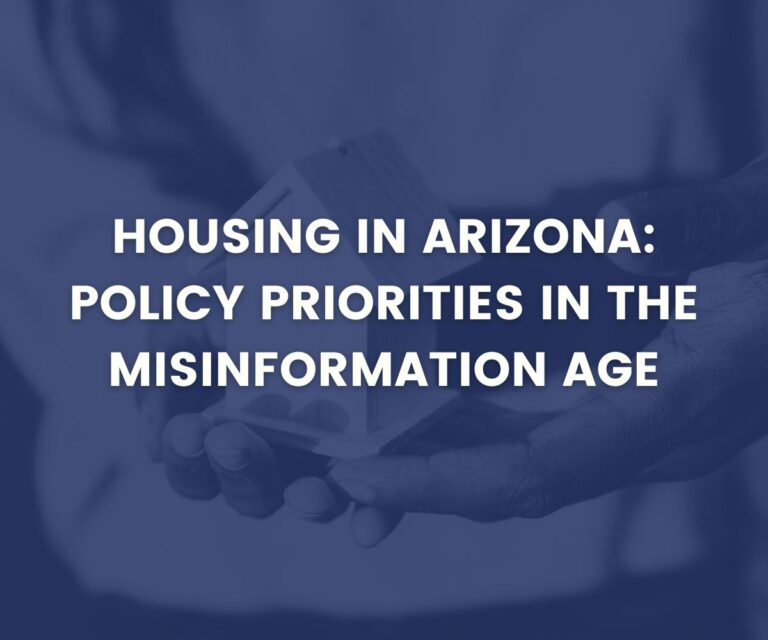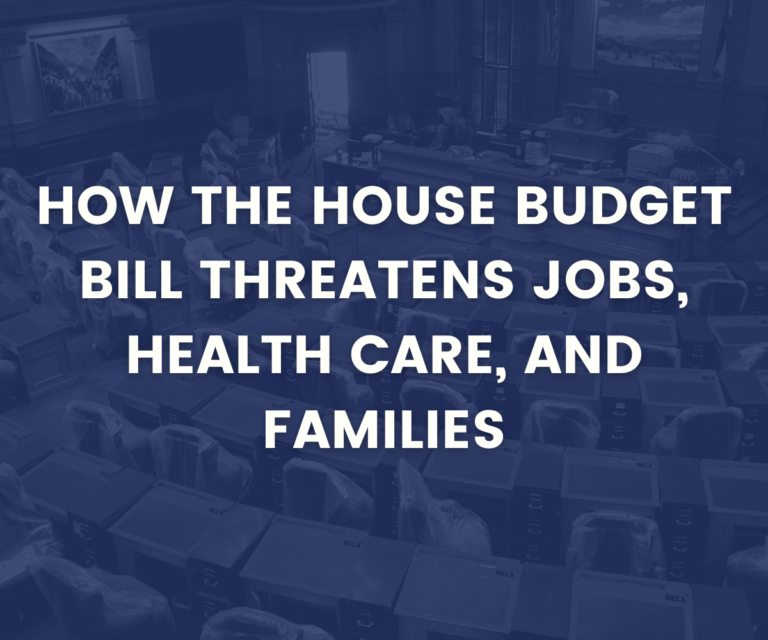Arizona Congressional Delegation Must Take Swift and Bold Action to Mitigate Economic Harms of COVID-19 Pandemic
MEDIA STATEMENT
(Phoenix, Arizona)
Thursday, March 19, 2020
The Arizona Center for Economic Progress calls upon Senators Sinema and McSally and the entire Congressional delegation from Arizona to take swift and bold action to mitigate the far-reaching health and economic harms of the COVID-19 pandemic. Arizona is depending on our leaders in Washington DC to provide desperately needed relief to prevent a state budget crisis, which would result in cuts in public services similar to those of the Great Recession, and to take steps to help Arizonans stay afloat during the economic downturn. These proactive measures must include (1) fiscal relief for states and (2) assistance for people who are struggling to make ends meet, including:
- Boosting incomes through direct and significant payments to households, especially for low-income individuals and households experiencing poverty, including those that do not file a tax return.
- Expanding access to the Unemployment Insurance (UI) system so that more workers who lose their jobs qualify, providing a federally-funded increase in weekly UI benefit amounts, and increasing the maximum number of weeks available to workers through federally funded weeks of additional benefits.
- Boosting food assistance through SNAP (formerly food stamps) and suspending harmful regulations that limit SNAP food assistance for people who struggle to find and keep a job.
The Families First Coronavirus Response Act that was enacted on a bipartisan basis this week was a good first step, but it was not structured to provide major economic stimulus to help minimize the risks of a sharp and deep economic downturn in Arizona.
“Corporate bailouts will not help Arizonans who are going to struggle to put food on the table and a roof over their heads during this crisis.” said David Lujan, Director of the Arizona Center for Economic Progress. “Arizonans will need a strong, comprehensive economic recovery package to help them stay afloat during these difficult times.”
Proven stimulus and relief measures can keep things from getting worse and put us on the path to a stronger economy once recovery is in sight. Now is the time for a comprehensive response to this crisis that includes help for state governments and Arizonans who are facing the greatest health and financial risks.
Read the entire letter below.
March 19, 2020
The Honorable Kyrsten Sinema
The Honorable Martha McSally
The Honorable Raúl Grijalva
The Honorable Paul Gosar
The Honorable David Schweikert
The Honorable Ruben Gallego
The Honorable Andy Biggs
The Honorable Tom O’Halleran
The Honorable Ann Kirkpatrick
The Honorable Greg Stanton
Dear Members of the U.S. Congressional Delegation from Arizona,
The Arizona Center for Economic Progress welcomes the bipartisan efforts underway to address both the public health crisis and the severe economic downturn starting to affect our state and its communities due to the COVID-19 pandemic. We appreciate the passage of H.R. 6201, the Families First Coronavirus Response Act as a down payment on what is needed, yet it is imperative for Congress to act quickly to do far more. We urge swift and bold action on timely, well-targeted policies to help contain and mitigate the far-reaching health and economic harms of the COVID-19 pandemic.
For Arizona, it’s crucial that the forthcoming federal economic response legislative package include:
- Additional fiscal relief to fend off a state budget crisis, which would result in cuts to public services at the state level, leading to even further economic hardship and drag.
Despite recent state surpluses, the pressures on Arizona’s state budget from the COVID-19 outbreak and the economic fallout are mounting and will quickly become severe. Congress must act aggressively now, before things start to spiral and our state enters a full-blown financial crisis.
Arizona will face rapidly rising costs as we seek to contain the virus, and those costs will grow as businesses begin laying off workers and incomes decline—forcing more people to turn to Medicaid, unemployment insurance, and other forms of public assistance to afford the basics.
At the same time, state revenue projections for the coming fiscal year will soon plummet due to businesses and individuals taking a hit, and this will knock state budgets far out of balance. This is especially true for Arizona, as much of our seasonal, service-based economy has begun to absorb major losses from event cancellations and shutdown measures.
Because they must balance their operating budgets annually, even in a recession, states may respond by starting to slash education funding and lay off public employees and cutting other critical public services, including assistance to families facing hard times, transportation, and public safety. During the 2008 Great Recession, Arizona suffered the largest cuts in the nation in public education funding for both K-12 schools and community colleges and universities. At that time, more than $1.2 billion in annual funding was cut from Arizona’s public schools and it has still not been fully restored. This, compounded with and decreased investment in affordable housing and social services, weakened the economic prospects for families and communities. If repeated in Arizona, these layoffs and spending cuts will create another downward spiral.
Aid to states like Arizona should arrive before states have begun to implement these cuts, since the goal is to prevent them. Congress must act aggressively now, before another state fiscal crisis, to provide more substantial emergency financial aid to states. The Families First Coronavirus Response Act is a good first step, providing about $36 billion emergency aid through increased federal Medicaid payments. But it’s grossly inadequate to address the fiscal crisis that states like ours are likely to face in the weeks and months ahead.
During the last recession, Arizona faced a budget shortfall exceeding $1 billion. And while the American Recovery and Reinvestment Act and extensions of the Act’s fiscal relief provisions provided aid to the state, it still wasn’t enough. Arizona, like other states, was forced to take actions during the Great Recession that made the recession worse and the recovery slower. Arizona faced a more than $1 billion budget shortfall resulting in thousands of Arizona children losing access to childcare and healthcare, the closure of state parks, reductions in public safety, and postponement of needed road repairs. Arizona has still not fully restored what it cut during the last recession.
- Additional measures to help families and individuals stay afloat amid the economic downturn and be able to purchase food and other essentials while also stimulating the economy. These measures should include:
- Boosting incomes through direct and significant payments to households, especially for poor and low-income individuals and households, including those that do not file a tax return.
- Expanding access to the Unemployment Insurance (UI) system so that more workers who lose their jobs qualify, providing a federally-funded increase in weekly UI benefit amounts, and increasing the maximum number of weeks available to workers through federally funded weeks of additional benefits. Arizona already has one of the highest unemployment rates in the country. Without these kinds of changes, many people will lose their jobs and have no access to UI, or they will have access to benefits that are too low and that end before the economy improves.
- Boosting food assistance through SNAP (formerly food stamps) and suspending harmful regulations that limit SNAP food assistance for people who struggle to find and keep a job. More than one in ten Arizonans rely on SNAP to put food on the table, the majority of which have children in the household. (Note: While the Families First Coronavirus Response Act included some temporary expansions of SNAP during the public health emergency, more action is needed to provide broader relief and to ensure that additional help is available when the economy is weak, even if the health emergency has subsided.)
- Helping to prevent housing crises and homelessness through a variety of mechanisms, such as providing additional cash infusions to SNAP households through electronic benefit cards so they can continue to pay rent and increasing resources for shelter care, Emergency Solutions Grants, and other housing programs. Arizona is already facing a very serious housing problem, with a rising number of people unable to afford decent housing and facing homelessness. As incomes fall, the housing needs will grow, and housing instability and homelessness during a public health emergency is particularly problematic.
The worst impact of a sharp economic downturn will be felt by Arizonans who were already struggling to make ends meet, including families experiencing poverty, workers with low-incomes, and people in rural communities that have had high poverty rates and low investment for very long periods of time. But well-designed stimulus and relief measures can help address those hardships, keep things from getting worse, and set our state and communities on a better path once recovery is in sight.
The measures recommended here are proven to be most effective in reducing poverty and stimulating the economy during a recession.
These are extraordinary times that call on collective action. We thank members of our delegation for leadership on this issue so far— and we are counting them to ensure that a robust economic stimulus package includes additional state fiscal relief and targeted assistance for households who need it most.
Sincerely,
David Lujan
Director/Arizona Center for Economic Progress



